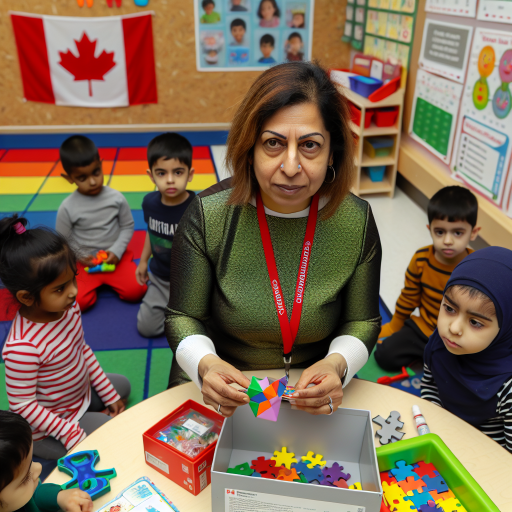Understanding the Role of Early Childhood Educators in Child Development
Foundational Impact on Development
Early childhood educators shape children’s cognitive and social skills.
They promote language development through interactive activities.
Furthermore, educators help children cultivate emotional intelligence.
By creating nurturing environments, they enhance children’s confidence.
Supporting Holistic Growth
These professionals guide holistic child development in various domains.
They address physical, social, emotional, and cognitive aspects simultaneously.
In addition, they create experiences that foster self-awareness and resilience.
Creating Inclusive Learning Environments
Early childhood educators strive to create inclusive classrooms.
They accommodate the diverse needs of children through differentiated instruction.
Moreover, they encourage cooperation and respect among peers.
Building Strong Relationships with Families
Educators establish meaningful partnerships with families.
They communicate regularly to foster trust and collaboration.
Additionally, they provide resources that support family engagement at home.
Continual Professional Growth
Professional development is vital for early childhood educators.
They engage in training to stay updated on best practices.
Moreover, educators seek mentorship opportunities within their communities.
This ongoing growth enhances their teaching strategies and effectiveness.
Importance of Continuous Professional Development for Educators
Enhancing Teaching Skills
Continuous professional development enhances educators’ teaching skills.
It equips them with new strategies and methodologies.
This learning translates into improved student outcomes.
Staying Updated with Standards
Professional development helps educators stay updated with educational standards.
It ensures they are aware of the latest curriculum changes.
Moreover, it aligns their practices with current best practices in education.
Networking Opportunities
Participating in professional development opens doors to networking opportunities.
Educators connect with peers who share similar interests.
Unlock Your Career Potential
Visualize a clear path to success with our tailored Career Consulting service. Personalized insights in just 1-3 days.
Get StartedThis collaboration fosters a supportive community.
Personal Growth and Confidence
Continuous learning inspires personal growth among educators.
It builds their confidence in their teaching abilities.
Additionally, it encourages them to take on leadership roles.
Adapting to Technological Advancements
Educators must adapt to rapid technological advancements in education.
Professional development provides them with necessary tech skills.
This adaptation enhances the learning experience for young children.
Improving Job Satisfaction
Engaging in professional development increases job satisfaction.
Educators feel more accomplished and fulfilled in their roles.
Consequently, this satisfaction leads to lower turnover rates.
Effective Strategies for Reflective Practice in Early Childhood Education
Embrace Continuous Learning
Continuous learning enhances professional growth among educators.
Participating in workshops keeps knowledge current and relevant.
Reading recent publications offers fresh perspectives and insights.
Networking with colleagues fosters shared learning and support.
Engage in Self-Reflection
Self-reflection helps educators assess their practices effectively.
Regularly journaling experiences aids in identifying strengths.
Setting aside time for contemplation nurtures deeper insights.
Asking reflective questions promotes critical thinking.
Utilize Peer Feedback
Peer feedback provides valuable perspectives on teaching methods.
Observing colleagues in action inspires new approaches.
Constructive discussions foster a collaborative learning environment.
Group feedback sessions can enhance professional understanding.
Set Professional Goals
Setting specific, measurable goals directs professional development.
These goals should align with personal values and interests.
Regularly revisiting and adjusting goals enhances focus.
Celebarating milestones promotes motivation and satisfaction.
Incorporate Family and Community Input
Family involvement enriches the educational experience for children.
Collecting feedback from families guides instructional choices.
Community resources can supplement professional development efforts.
Building partnerships creates a supportive network for educators.
Leverage Technology for Growth
Technology tools facilitate access to online courses and seminars.
Digital platforms foster global connections with other educators.
Utilizing educational apps can enhance teaching strategies.
Keeping abreast of tech trends helps educators stay relevant.
Explore Further: Careers in Special Education: How Canada Supports Diverse Learning Needs
Building Collaborative Relationships with Families and Communities
Understanding the Importance of Collaboration
Collaborative relationships enhance children’s learning experiences.
These partnerships create a supportive environment for children.
Moreover, they foster a sense of belonging among families.
Implementing Effective Communication Strategies
Open communication builds trust between educators and families.
Utilize various platforms to share information regularly.
Newsletters, social media, and meetings can enhance outreach.
Engaging Families in the Learning Process
Encourage families to participate in classroom activities.
Family involvement enriches educational experiences for children.
Moreover, it helps educators understand family dynamics better.
Plan events that invite family participation and feedback.
Building Community Connections
Forming connections with local organizations benefits everyone.
Partnerships with libraries, museums, and parks enhance learning.
Additionally, community resources provide valuable support.
Seek opportunities for field trips and guest speakers.
Providing Resources and Support to Families
Offer workshops to help families navigate educational challenges.
Provide resources on child development and parenting strategies.
Moreover, connect families with community support services.
Evaluating Collaborative Efforts
Regularly assess the effectiveness of your collaborative practices.
Gather feedback from families and community partners.
Use this information to improve relationships and programs.
Continual evaluation supports ongoing growth and development.
See Related Content: From Classrooms to Screens: How EdTech is Shaping Canadian Education Careers
Utilizing Technology and Online Resources for Professional Growth
Embracing Online Learning Platforms
Online learning platforms offer a wealth of resources for early childhood educators.
These platforms enable flexible learning anytime, anywhere.
For instance, sites like Coursera and EdX provide courses tailored to various expertise levels.
Additionally, educators can find specialized workshops on child development and teaching strategies.
Tapping into Webinars and Virtual Conferences
Webinars are excellent for gaining insights from industry experts.
Many organizations, like NAEYC, host regularly scheduled virtual events.
Participating in these sessions enhances professional knowledge and networking opportunities.
Moreover, recordings are often available for later viewing, ensuring accessibility.
Engaging with Online Communities
Online communities serve as valuable support networks for educators.
Platforms such as Facebook and LinkedIn host groups focused on early childhood education.
Joining these groups fosters collaboration and idea-sharing among peers.
Furthermore, active participation can lead to mentorship opportunities.
Leveraging Digital Resources and Tools
Numerous websites provide teaching materials and resources for free or at low cost.
Resources like Teachers Pay Teachers and Scholastic offer lesson plans and activities.
Utilizing these tools can save time and enhance classroom experiences.
Additionally, technology tools such as ClassDojo and Seesaw facilitate communication with families.
Staying Updated with Educational Blogs and Podcasts
Blogs and podcasts offer ongoing professional development opportunities.
Educators should follow reputable sources like Edutopia and The EdSurge Podcast.
These platforms keep educators informed about current trends and best practices.
Listening to expert interviews provides fresh perspectives and innovative ideas.
Find Out More: How Digital Learning Is Creating New Career Opportunities in Canada’s Education Sector

Setting Personal and Professional Goals for Career Advancement
Understanding the Importance of Goal Setting
Setting goals provides direction for educators seeking professional growth.
Clear objectives help to measure progress and achievements.
Furthermore, goals ignite motivation and focus during challenging times.
Types of Goals to Consider
Professional goals can be categorized into short-term and long-term objectives.
Short-term goals might focus on improving specific teaching skills.
Long-term goals usually involve aspirations for leadership positions.
Consider developing SMART goals: Specific, Measurable, Achievable, Relevant, and Time-bound.
Identifying Personal Strengths and Areas for Improvement
Self-assessment is a crucial step in goal setting.
Identify your strengths to leverage in your teaching practice.
Equally, recognize areas where you can grow professionally.
Gather feedback from colleagues and supervisors to gain insights.
Creating an Action Plan
An effective action plan outlines steps needed to achieve your goals.
Break down larger goals into smaller, manageable tasks.
Assign deadlines to each task to maintain accountability.
Additionally, consider resources and support available to you.
Tracking Progress and Adjusting Goals
Regularly review your progress toward your goals.
Reflect on what is working and what may need adjustment.
Don’t hesitate to revise goals as circumstances change.
Staying flexible can lead to better outcomes in your career advancement.
Seeking Mentorship and Professional Development Opportunities
Find mentors who inspire and challenge you to grow.
Engage in professional development workshops and courses.
Networking with other educators can provide valuable insights and support.
Consider joining professional organizations to stay informed about best practices.
Learn More: Why Pursuing a Career in Early Childhood Education Is Growing in Canada
Engaging in Peer Mentoring and Networking Opportunities
Benefits of Peer Mentoring
Peer mentoring enhances professional development for educators.
It fosters a supportive community where sharing experiences is encouraged.
Moreover, it creates opportunities for constructive feedback and growth.
Educators can gain fresh perspectives through collaboration with peers.
Finding a Mentor
Start by identifying colleagues with experience in your areas of interest.
Seek out individuals who demonstrate effective teaching practices.
Be proactive in reaching out and expressing your desire to learn.
Consider joining professional associations that facilitate mentorship opportunities.
Building a Professional Network
Networking broadens your access to resources and support systems.
Attend conferences and workshops to meet other educators in your field.
Utilize social media platforms to connect with educators worldwide.
Engage in discussions and share valuable content to establish your presence.
Maintaining Connections
Regular communication enhances your professional relationships.
Schedule check-ins with mentors and peers to share updates and challenges.
Participate in online communities to stay connected with fellow educators.
Offer your assistance and expertise to strengthen these connections.
Continuing Professional Development
Commit to lifelong learning by pursuing workshops and courses.
Stay informed about the latest trends in early childhood education.
Engage in collaborative projects to apply new knowledge in practical settings.
Reflect on your experiences with peers to evaluate your growth.
Staying Informed About Current Research and Best Practices in Early Childhood Education
Embracing Continuous Learning
Early childhood educators should prioritize continuous learning.
This focus enhances their teaching skills and professional effectiveness.
Participating in workshops and conferences fosters knowledge sharing.
Furthermore, networking with peers opens opportunities for collaboration.
Utilizing Online Resources
The internet offers a wealth of information on early childhood education trends.
Educators can access research journals, webinars, and online courses.
Subscribing to educational blogs keeps educators updated on best practices.
In addition, social media platforms can facilitate group discussions.
Incorporating Current Research
Integrating current research into practice is crucial for effective teaching.
Educators should evaluate studies relevant to their teaching contexts.
Applying evidence-based strategies supports children’s developmental needs.
This approach also fosters critical thinking and reflective practices.
Collaborating with Experts
Collaboration with experts enriches an educator’s knowledge base.
Seeking mentorship from seasoned professionals can guide professional growth.
Partnering with local universities can create valuable research opportunities.
Additionally, participating in community networks provides access to resources.
Implementing Best Practices
Identifying and implementing best practices enhances classroom experiences.
Educators can observe peer practices to gather new ideas.
Trial and feedback loops help refine teaching methods and strategies.
Reflecting on what works and what doesn’t maximizes learning outcomes.




